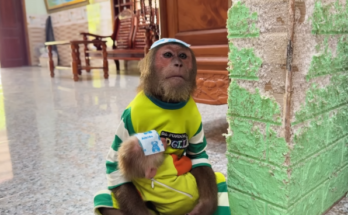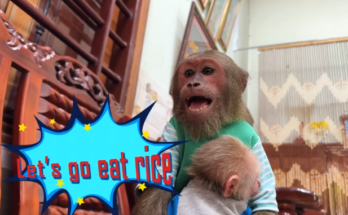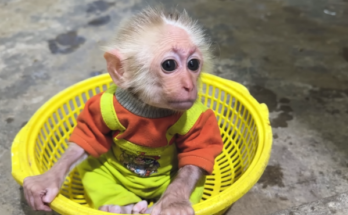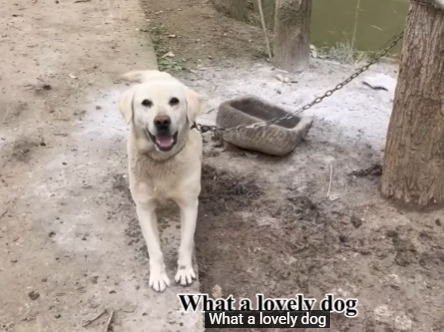
The chain around his neck was so tight it had become part of his body—embedded, rusted, and unforgiving. Every time he moved, it scraped against his skin, leaving fresh scars over old wounds. He had long forgotten what freedom felt like. The world had shrunk to a few square feet of dirt, a dented water bowl, and a rickety wooden box that barely kept out the rain.
His name was never really a name—just a shout, a grunt, or sometimes nothing at all. But deep inside, he had once had a spark, a soul that wanted to run, play, and love.
They called him “Dog,” and that was it. For years, that’s all he had been to them—a barking thing on a chain, a shadow guarding the yard of a half-abandoned house on the edge of town.
Seasons changed, but his world stayed the same. In the summer, the sun scorched his fur until he panted endlessly, tongue lolling in thirst. In the winter, snow piled up around his legs as he curled tightly against the bitter wind. The chain clinked with every shiver.
Sometimes, passersby would stop and look. Children would point, adults would whisper, and then they would walk away. “Poor dog,” they’d say, “but it’s not our problem.”
Yet every time someone passed, he lifted his head and wagged his tail, stretching out his claws into the dirt as far as the chain would allow. His eyes pleaded silently: Please, don’t go. Just a touch. Just one kind word.
But no one came.
The years wore him down. His fur grew patchy, his teeth dull, and his body weak. But his heart—fragile as it was—still held a small ember of hope. He dreamed, perhaps foolishly, that one day the chain would fall away, and he would feel grass under his paws without restraint.
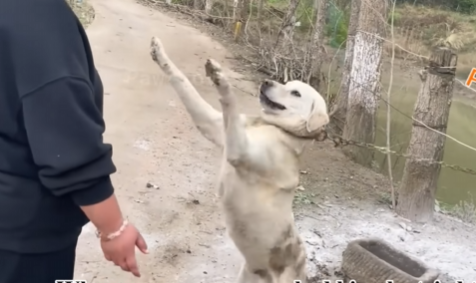
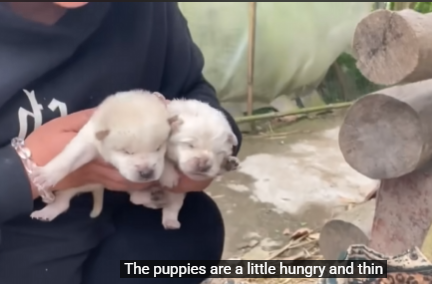
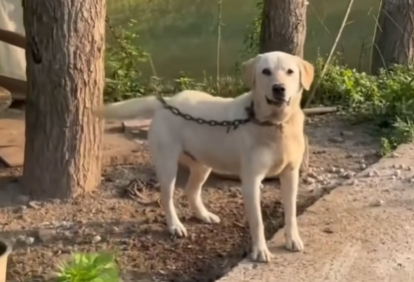
That day came unexpectedly.
A rescue team, responding to a neighbor’s anonymous tip, arrived one gray morning. They found him exactly as described—skinny, trembling, and chained to a rotting post. When they approached, he didn’t bark or growl. He just stared, confused, tail wagging hesitantly, afraid that kindness was just another illusion.
One of the rescuers, a woman named Mara, knelt down slowly. Her voice was soft, almost trembling. “Hey there, sweetheart. It’s okay. We’re here now.”
He flinched as she reached for the chain, his body braced for pain. But instead of a strike, there was the sound of metal snapping—a quick, metallic clink—and then silence.
He blinked, disoriented. The weight that had bound him his whole life was suddenly gone. He took one cautious step forward, then another, each one shaky but free.
Mara wrapped a blanket around him, her tears mixing with the cold drizzle that had begun to fall. “You’re free now,” she whispered, her voice cracking. “No more chains, my boy.”
At the shelter, he was given a real name—Boris. A small thing, but powerful. It meant that someone finally saw him as a being, not an object.
The first days were difficult. Boris was terrified of doors, loud voices, and hands reaching too fast. He would flinch and hide in the corner, convinced that pain always followed attention. He had forgotten what it meant to be touched gently.
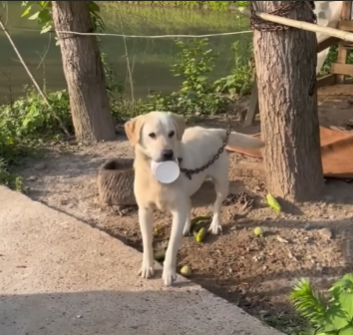
But the shelter staff were patient. They didn’t push him; they just stayed nearby, speaking softly, leaving food and blankets close enough for him to reach when he felt safe.
One evening, Mara sat on the floor beside his crate, reading aloud in a low, soothing tone. She wasn’t sure why she did it—maybe to fill the silence that hung heavy around him. Slowly, Boris crept closer, his claws tapping the floor lightly. He stopped a few inches away and watched her face. For the first time, she saw curiosity in his eyes.
She held out her hand. He sniffed it, trembled, and then—so carefully it broke her heart—rested his head against her palm.
Mara smiled through tears. “That’s it, boy. You’re safe now. I promise.”
From that moment, everything began to change. It wasn’t quick, and it wasn’t easy. Healing never is.
Boris had to relearn how to live. How to trust. How to accept that food would come every day, that hands could offer comfort instead of hurt, that he could sleep without fear of being kicked awake.
There were setbacks—moments when a sudden noise would send him hiding, moments when his eyes filled with panic for reasons no one could see. But with every passing week, the light in him grew stronger.
He began to play again. Tentatively at first—a slow wag of the tail, a cautious chase after a squeaky toy. Then, one morning, Mara found him running across the shelter yard, full speed, ears flapping, tail high, barking at the wind. It was clumsy and joyous and utterly beautiful.
Everyone stopped to watch. Some cried quietly. Because that run wasn’t just movement—it was freedom made visible.
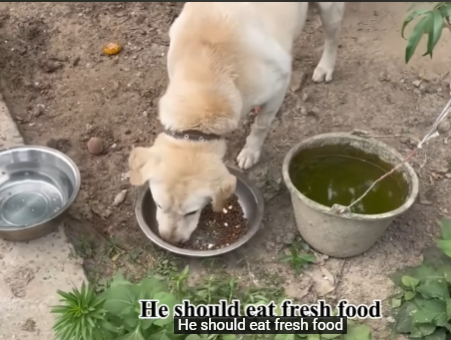
Word of Boris’s story spread online. People were outraged by the cruelty he had endured and inspired by the resilience he showed. Messages poured in, from as far as Germany, the U.S., and Australia, asking about adoption. But Mara knew that after all those years of pain, he needed more than just a new home—he needed the right one.
Then one day, a couple came to the shelter—Nadia and Anton, a middle-aged pair who had lost their old rescue dog a year before. They didn’t rush toward Boris or overwhelm him with affection. Instead, they sat quietly in the grass, letting him come to them.
It took ten minutes. Then fifteen. And then Boris walked over, sniffed Anton’s sleeve, and gently pressed his nose into Nadia’s hand.
Mara smiled. “He’s chosen you,” she said softly.
When Boris went home with them, the shelter staff gathered to say goodbye. Mara knelt beside him one last time, kissing the top of his head. “No more chains, okay? Just love. Only love.”
The days that followed were the happiest of his life. Boris learned the rhythm of a family—the sound of laughter, the smell of dinner, the warmth of a couch he was allowed to sleep on. He had his own bed, his own toys, and a backyard where the only thing around his neck was a blue collar with his name engraved.
Sometimes, he would still stretch out his claws in his sleep, as if reaching for something just out of grasp. But when he woke, he’d find a hand resting gently on his head, reassuring him that he was no longer alone.
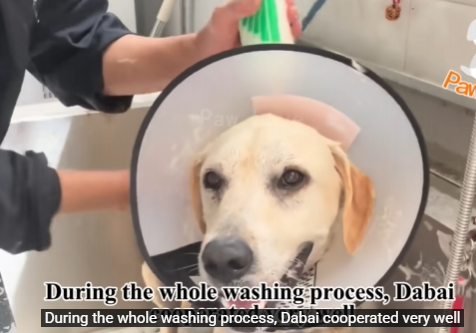
Months later, Mara visited him. She barely recognized the dog that bounded across the yard to greet her—strong, healthy, eyes bright with joy. He ran straight into her arms, tail wagging furiously, licking her face with the same desperate energy he once used to reach for love through his chain.
Tears rolled down her cheeks as she whispered, “You did it, Boris. You really did it.”
For so long, he had lived in silence, chained and forgotten. But now, the air around him was filled with laughter and life. His world, once no bigger than a few feet of dirt, had become endless fields, endless affection.
And though his neck still bore the faint mark of where the chain once lay, it no longer symbolized suffering. It was a reminder of how far he had come—from despair to devotion, from cruelty to care.
In his new home, under the soft glow of sunset, Boris would often lie by the window, watching the world beyond the fence. His eyes, once filled with fear, now held peace. And every evening, when Nadia called his name, he’d race inside, tail wagging, heart full.
Because he had learned the truth at last: love is worth waiting for—and even the most broken soul can find a way back to it.
From a chain to freedom, from a lifetime of longing to a heart finally full, Boris’s story stands as a quiet but powerful reminder: when cruelty meets compassion, hope is reborn.
